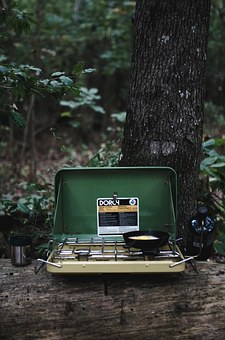 Since 2001 it seems like every year there are more and more rules about what you can and can’t bring onto a plane, and it can be hard to keep track of any of it. In fact, for an outdoorsman it can be downright confusing as you’re suddenly looking at things like barbed hooks on fishing lures, fillet knives, propane tanks attached to camping stoves.
Since 2001 it seems like every year there are more and more rules about what you can and can’t bring onto a plane, and it can be hard to keep track of any of it. In fact, for an outdoorsman it can be downright confusing as you’re suddenly looking at things like barbed hooks on fishing lures, fillet knives, propane tanks attached to camping stoves.
If you’re like me at that point, you’re wondering if an honest mistake is going to get you pulled out of line and threatened with jail time.
While somethings should be relatively obvious (not trying to pass knives or guns in carry-on luggage, for example) some other gear isn’t nearly so obvious. As someone planning several future thru hikes this got me looking at my gear and wondering: Can I take my camping stove on a plane?
The answer I received from contacting the TSA is that, yes, camping stoves can be packed on a plane as either checked luggage or with a carry on bag. However stoves using fuel need to have those fuel canisters completely drained so there is no fuel, no gas, and not even any vapors or residue left behind, and it’s important to know there are some caveats with that – and I’ll gladly share what I discovered with you!
Make sure to read the whole article because while the next section is about the exact rules for flying with a camp stove, there are some concerns that can derail your efforts anyway – so you need to be prepared to weigh the risks before heading to the airport!
Table of Contents
The Rules for Flying with Camping Stoves
The good news is that the TSA, the agency in charge of safety at airports and flights, has rules that specifically state that flying with camping stoves is allowed. You can fly with your favorite camping stove.
However, there are several very important rules and regulations you need to be aware of before packing. The far majority of camping stoves are based off of fuel with the three most common of those being alcohol, propane, or mixed fuel. All three of these styles of camping stoves are a problem because of the flammable fuel.
TSA Rule #1: No flammable fuels will be allowed on the plane.
This is a big one and it is completely understandable. That is for everyone’s safety. So what’s this mean considering that most camping stoves use fuel that is definitely flammable?
This means that the attached fuel tank must be completely empty. No propane, no alcohol, no mixed fuel. Absolutely no flammable liquids or gasses are allowed on the plane regardless of whether you’re going withe checked baggage or carry-on.
This means you must thoroughly empty the fuel containers prior to getting to the airport. This should be done many days before.
TSA Rule #2: Fuel contains can have no trace of vapors.
Remember that part about a thorough cleaning? Not only should a TSA agent deny any camp stove fuel from getting onto the plane but if the container has even the faintest whiff of vapors then they are supposed to deny you as well.
This is a major part of the reason that thoroughly cleaning the stove many days ahead of time is crucial, because you need to get rid of all traces of the fuel. Just a whiff of alcohol or propane is enough for them to deny your stove.
TSA Rule #3: The TSA agent has the final say, period.
This is an important catch-all to recognize because it means even if you clean your camp stove ahead of time, even if there is no fuel or no trace of fuel, even if you have the printed out rules from the TSA’s own website.
Generally this shouldn’t be an issue, as long as you’re not being a dick or insufferable know-it-all, but each situation can be different and at the end of the day if the TSA agent says no, it’s not getting on the plane.
Pro Tip: Make sure to print off copies of the TSA rules from online so you can show them to TSA agents who may have never been trained with these rules. This at least shows you’ve done your homework, understood the regulations, and worked to come into compliance with those rules before proceeding. This will drastically increase your chances of success.
But They Can Confiscate It If…
The overwhelming number of camping stoves are propane, butane, or alcohol. All of these have the earlier issues of fuel and vapors. There’s also the fact that if you have TSA agents who are non-campers and just not comfortable with letting your equipment onto the plane and that’s a problem.
While it is possible to purchase additional fuel sources once you’ve reached your destination, time and expense are issues you will have to deal with in those situations.
If a paranoid TSA agent believes they smell vapors when they don’t, then there’s not much you’re going to be able to do about it even if you’ve taken all the right steps to make sure your camping stove is TSA-compliant.
Then there is that aforementioned “catch-all” rule at the end that allows a TSA agent to simply disallow the camp stove for any reason. In other words, it’s very clear that if they even imagine smelling the faintest whiff of fuel, or if they don’t feel comfortable letting the fuel tank on the plane, they don’t have to. The final say is always with the TSA agent.
Here is the TSA page bringing up this point and adding more useful links to figure out what your options are.
For these reasons, the TSA actually recommends that you ship your camping stove if possible as opposed to taking it on a plane, and if you are going to try to put the stove in checked or carry on luggage you still need to do a truly thorough job to give yourself the best possible chances of getting through without issue.
Two Obvious Workarounds
There are two potential workarounds that can make it easier to get through the TSA with a camp stove, but they might not be appropriate for everyone as they are very niche choices.
There are camping stoves like solo stove camping stoves that are designed to be fueled by twigs, sticks, and normal pieces of wood that would be used to create any campfire but enhance the design so a very small amount of fuel can create a remarkable amount of long-term heat. Since these types of camping or hiking stoves don’t come with fuel that needs to be attached to the stove, you should have no problem carrying these types of stoves onto the plane.
In addition, there are some solar camp stove designs, though most of these are more compact and act more like a burner for camping purposes. Go with them uncharged to avoid the remotest chance of an accident and you should be good to go.
Packing those very specific types of camping stoves shouldn’t be a problem, but whether this is practical or not for your specific needs is another story, but it is a viable option when looking specifically at air travel with your camping or hiking gear.
In Summary
So the short answer is that yes, you can pack camping stoves that don’t use gas fuel without worry, for the much more common alcohol or propane fueled stoves, as long as the fuel is gone and there are no hints of vapors left you should be good to go. Keep the tips in this article in mind, understand that it isn’t a slam dunk, and make an informed decision on how to travel with your camping stove from there.

